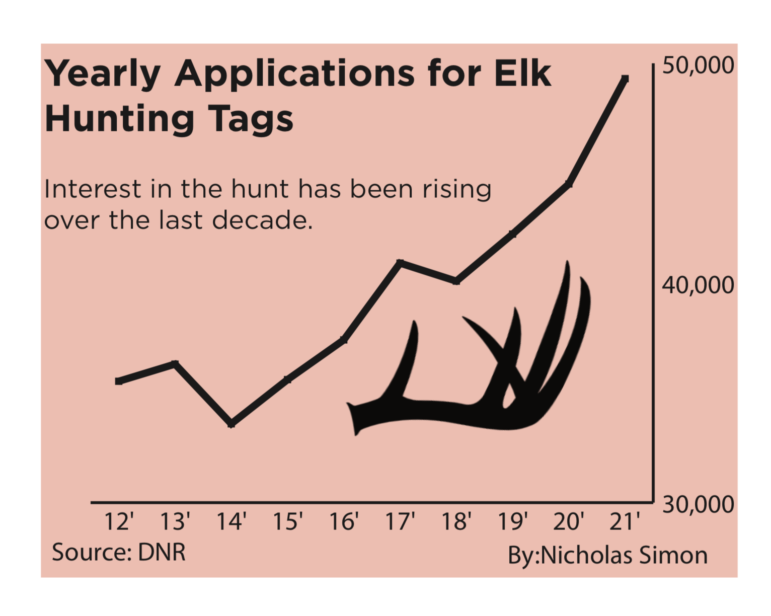By NICHOLAS SIMON
Capital News Service
LANSING – More than 49,000 hunters applied to hunt Michigan elk in 2021, a record that is part of a steady decade-long rise, state wildlife officials say.
They applied for one of only 300 available tags to hunt the state’s herd during the year, which is estimated to number somewhere between 900 and 1,500 elk, according to the Michigan Department of Natural Resources.
“They are a large charismatic animal that’s iconic for Michigan,” said Rachel Leightner, a wildlife outreach coordinator for the Michigan Department of Natural Resources. “So, the hunt is really a coveted experience.”

Gaylord Area Tourism Bureau
They are also profitable. The Department of Natural Resources estimates that hunters spend an average of $1,200 per elk hunt. That is double what the average American spends on a standard four-day domestic vacation, according to the U.S Bureau of Labor Statistics.
Elk-related recreation outside of hunting has also been a growing trend in state-managed areas, Leightner said. Viewing sites in the elk range attract visitors from the entire Great Lakes region.
The interest in hunting elk has grown steadily, Leightner said. There were at least 5,000 more applications in 2021 than the previous year, Leightner said.
Because of the demand, a lottery has been in place since the inception of the hunt in 1984. The limited number of tags available each year means that some repeat applicants could end up waiting decades for their opportunity.
The limits are put in place to ensure that this herd is managed better than Michigan’s native elk, which disappeared in the 1870s due to overhunting and extensive forestry. Elk prefer old-growth forests and wetlands and used to be the dominant species of northern Michigan until eventually being replaced by deer, which thrived in more lightly wooded forests that came later, according to the department.
Elk were reintroduced to Michigan in 1917 from the then newly established Yellowstone National Park, according to the DNR. The population grew to about 1,500 by the 1960s but was decimated by habitat destruction and unregulated poaching. By the mid-1970s, there were only about 200 elk in the state, according to the wildlife agency. An improved conservation strategy saw the numbers quadruple to over 800 in the 1980s when the hunt was formally reestablished.
Since then, the elk have primarily ranged the Pigeon River State Forest in northern Michigan. Their numbers are strictly monitored by the department which says that they try to keep the herd to 1,000 elk to keep a balance with the environment.
Recent counts from the Department of Natural Resources say the elk population is around 1,200 after the preliminary elk hunt in September that culled 73 elk from the herd out of 100 permits given. To get the numbers back to more manageable levels, the department issued 200 permits for the hunt set to take place in December.
Keeping the elk population at a manageable level is a benefit to the animals, hunters, and nature lovers in general, according to Ian FitzGerald, the policy and events coordinator for the Michigan United Conservation Clubs, the state’s largest environmental lobby. This is because the remaining elk range is so limited that a larger herd would lead to competition issues.
“There is a biological carrying capacity for elk within a certain range of northern Michigan,” FitzGerald said. “The population really can’t go above 1,200 or 1,300, or then you have problems with starving.”

Nicholas Simon
Interest in elk hunting has risen over the last decade.Hunters fund a large portion of the department’s elk habitat rehabilitation. The department raised approximately $250,000 on the sale of lottery applications alone, and the DNR estimates that hunters spent an additional $230,000 on travel expenses and supplies.
“Almost all the people who do draw elk tags know this is a once-in-a-lifetime type of tag,” FitzGerald said. “People are hiring local guides that know the area to take them out, staying at local lodging and buying bullets at local stores”
“Elk viewing in the northern lower is a really popular activity, Leightner said. “It brings people from all across the state and sometimes out of state to come see our wild herd.”
But, for the lucky few who get selected for the coveted tag, the elk hunt provides a unique way to experience these animals, according to department officials.
“It really is an experiential hunt,” Leightner said. “You get to spend days in northern Michigan scouting and tracking elk. Maybe you harvest an animal, and maybe you don’t. You still get a great experience.”